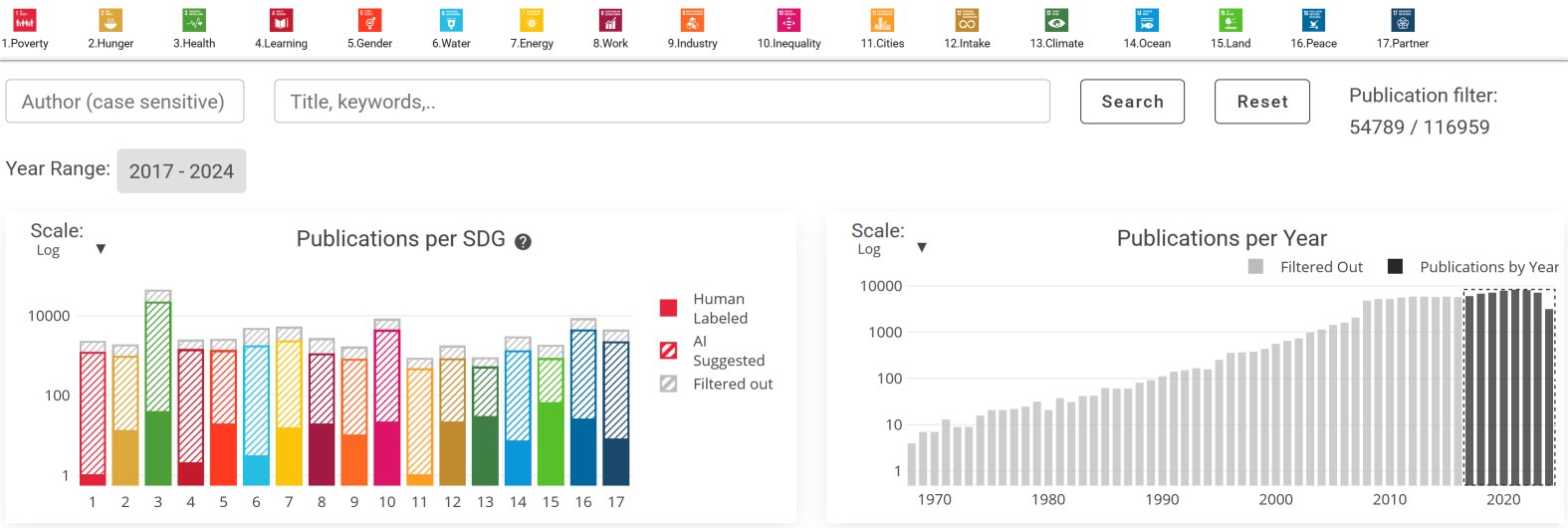Sustainability

2025-06-17 - Event: Launch, Workshop, and Expert Panel

Registration Link:
Introduction
In this interdisciplinary research stream, we focus on leveraging interactive data visualization techniques and methods to map UZH research to 17 Sustainable Development Goals (SDGs) defined by the United Nations. Examples of SDGs are «Clean Water and Sanitation», «Gender Equality», and «Responsible Consumption and Production». This research stream represents an innovative form of Human-AI collaboration and human-centered design.
In our subprojects, we bring different benefits to people:
- SDG Research Scout enables to explore UZH publications related to SDGs and gain an overview about these
- SDG Author's Network enables to discover researchers and gain an understanding about their SDG-related research, fostering collaborations
- SDG Gamification Approaches leverage citizen science methods and gamification elements to include the public in the labeling process of UZH publications to the SDGs, increasing public awareness and participation in research
SDG Research Scout
SDG Research Scout represents the core research project in this stream. SDG Research Scout is a system using cutting-edge NLP, AI, as well as interactive data visualization and analysis technology. It enables UZH researchers and sustainability experts to explore SDG-related publications interactively. The system offers UZH members flexible and intelligent access to all UZH publications relevant to the SDGs and will serve as a pilot model for the combination of AI and sustainability research. Furthermore, the SDG-based classification labels generated by the system can be integrated into the UZH repositories to support publication discovery.
The SDG Research Scout workflow includes data collection, natural language processing (NLP), automatic publication-to-SDGs mapping, exploration, explanation, validation, labeling, and remodeling. Through these steps in the workflow, the system will iteratively improve its mappings through predictions, create a curated dataset with SDG labels, and ultimately enable users to efficiently explore and engage with SDG-relevant UZH publications. The project will be developed in milestones focusing on data collection and model training, as well as exploration and validation within the UZH Sustainability Team.
The infrastructure built and demonstrated will support UZH-internal and -external stakeholders in accessing and making use of SDG-related UZH research results, aligning research with SDGs, discovering opportunities for interdisciplinary collaborations, and identifying research gaps.
The SDG Research Scout is funded by the Digitalization Initiative of the Zurich Higher Education Institutions (DIZH). Project partners include the Department of Informatics (IFI), the Department of Computational Linguistics (CL), and the UZH Sustainability Team, as well as the associated ZORA infrastructure of the University Library Zurich.
Here you can find a short interview about the DSI project.
SDG Research Scout: User Study
SDG Research Scout is currently in its evaluation phase. We are looking for sustainability experts to join our user study. The user study investigates human factors and strategies influencing the labeling process of publications related to SDGs as well as user needs that can improve the usability of the tool. The user study will inform further development of the SDG Research Scout. Please reach out to Jana Sedlakova ([email protected]) if you would like to participate.
SDG Research Scout: Open Position
We are looking for a talented student to conduct an independent study focusing on the evaluation of the SDG Research Scout. The evaluation will investigate human factors and strategies influencing the labeling process of publications related to SDGs as well as user needs that can improve the usability of the tool. Please reach out to Jana Sedlakova ([email protected]) if you would like to apply.
SDG Research Scout: Labeling Publications by Sustainability Goals
.png)
The 17 SDG goals form an interesting machine learning task that we want to study as one representative labeling application: can we effectively identify sustainability contributions in scientific publications? For that purpose, an AI component will be fed with a growing training dataset of scientific publications; this training dataset will interactively and iteratively be extended with additional labeled publications, as the result of a human-machine collaboration approach. The approach is based on the VIAL-process as described below.
The VIAL Process, as proposed by Bernard et al.

The VIAL process. Four algorithmic models (green) and two primary visual interfaces (red) are assembled to an iterative labeling process. To resemble the special characteristics of the Active Learning and the Visualization perspective, the VIAL process contains a branch (from "Learning Model” to “candidate suggestion” and “result visualization,” since both are complementary). The VIAL process can be applied for data exploration and labeling tasks. The output of the VIAL process is threefold: labeled data, learned models, and gained knowledge.
Publications
The IVDA group members have more than 20 publications in the VIAL realm. A hub with pointers to individual Visual-Interactive Labeling (VIAL) papers can be found here.